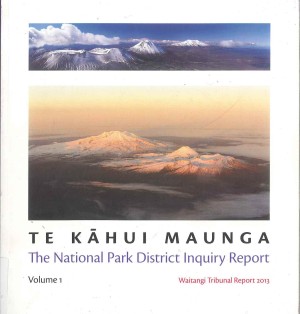Waitangi Tribunal releases its report on Tongariro National Park claims

The Waitangi Tribunal has today (12 November 2013) released its final report on 41 Treaty claims of ngā iwi and hapū of te kāhui maunga, the chiefly cluster of mountains, which include Tongariro, Ngāuruhoe, Ruapehu, Pīhanga, Hauhungatahi, and Kakaramea. All iwi and hapū who had their claims heard have close whakapapa links to these mountains and to each other.
The Tribunal inquiry panel comprised Chief Judge Wilson Isaac (presiding officer), the Honourable Sir Doug Kidd, Dr Monty Soutar, and Sir Hirini Mead.
The Tribunal’s report addresses two central issues it considered to be of national importance: the creation and management of the Tongariro National Park and the establishment and operation of the Tongariro power development scheme.
In 1887, Tūwharetoa paramount chief Horonuku Te Heuheu agreed to tuku (transfer) the mountains – te kāhui maunga – into joint trusteeship with the Crown. The same year, the Crown established New Zealand’s first national park.
Historically, Te Heuheu’s gesture has been referred to as a ‘noble gift’. This description the Tribunal found to be inaccurate: the tuku was not, as the Native Minister believed, an English-style gift of the mountains to the Crown but, rather, an offer of partnership with the Queen as joint trustee and custodian of the mountains. Te Heuheu expected this partnership to ensure that Ngāti Tūwharetoa would never lose their association with the mountains, which would be protected for the benefit of Māori and Pākehā forever.
The Tribunal found that the partnership delivered little for Māori. The Crown did not provide compensation for lands compulsorily acquired for Tongariro National Park. Nor did it consult with Whanganui iwi over the establishment and subsequent governance of the park, despite its awareness of their interests in the southern area of the park. Subsequently, in managing the park the Crown made no clear provision in its policy and legislation for ngā iwi o te kāhui maunga to exercise rangatiratanga over their taonga. The Tribunal concluded that the Crown had failed to honour either the Treaty partnership or the partnership offered by Te Heuheu.
The Tribunal recommended that the Crown honour its obligations and restore the partnership intended by the 1887 tuku of the mountains. It recommended that Tongariro National Park should be made inalienable and held jointly by the Crown and ngā iwi o te kāhui maunga under a new Treaty of Waitangi title and that the park be transferred from Department of Conservation control to co-management by a statutory authority comprising Crown and iwi representatives.
The other main issue in the inquiry was the Tongariro power development scheme. For ngā iwi o te kāhui maunga, the Tribunal found, their waterways are taonga, ownership and control of which are held in accordance with tikanga Māori and have never been relinquished. They retain residual proprietary rights in the waterways of the inquiry district, and the right to develop them.
The Tribunal found that, when the Crown set up the scheme, it met with Ngāti Tūwharetoa but did not consult the Lake Rotoaira trustees or Whanganui iwi. The Crown’s 1972 agreement with the trustees, which denied the lake’s owners any commercial benefit, was itself a significant Treaty breach. In operation, the scheme’s impact on lakes and rivers has resulted in a loss of water quality, habitat, and food and fish resources, particularly at Lake Rotoaira.
The Tribunal found that the Crown did not compensate the owners for the detrimental impacts of the scheme or for the use of Lake Rotoaira for hydropower storage. It recommended significant compensation to remedy these breaches and that the residual property rights of ngā iwi o te kāhui maunga in their waterways be given due recognition.
The Tribunal’s report gives its findings on many other claims arising from the history of the relationship between ngā iwi o te kāhui maunga and the Crown. Land issues feature prominently. On the operations of the Native Land Court in the nineteenth century, the Tribunal noted the Crown’s acknowledgement that the failure to make adequate provision for communal government mechanisms breached the Treaty and contributed to the erosion of tribal structures. The Crown’s Treaty breaches in relation to the court, the Tribunal found, resulted in prejudice to ngā iwi o te kāhui maunga.
Between 1880 and 1900, over half of all Māori land in the inquiry district was alienated, the large majority of it purchased by the Crown. The Tribunal endorsed the findings of previous Tribunal reports that the Crown’s practices undermined community ownership and collective decision-making and were in Treaty breach.
On public works takings of Māori land, the Tribunal found the Ōtūkou quarry to be a serious instance of Treaty breach. It recommended compensation and reiterated calls in a number of Tribunal reports for a reform of public works legislation.
The Tribunal found that Māori rights in geothermal resources has been significantly prejudiced by the Crown’s appropriation of their control and management. It recommended that the joint interest in sustainable management of the geothermal resource be reflected in the management regime and that a national policy statement on the geothermal resource be produced.
The Tribunal’s general conclusion was that the Crown had committed numerous serious Treaty breaches. These had considerable economic, social, cultural, environmental, and spiritual repercussions for ngā iwi o te kāhui maunga, for which it recommended substantial and culturally appropriate compensation.
Volume 1 of the Te Kāhui Maunga report [PDF, 7.2 MB]
Volume 2 of the Te Kāhui Maunga report [PDF, 12 MB]
Volume 3 of the Te Kāhui Maunga report [PDF, 13 MB]
Te Kāhui Maunga p [PDF, 12 MB]ress release [PDF, 99 KB]
For media inquiries, contact the Ministry of Justice media centre(external link)